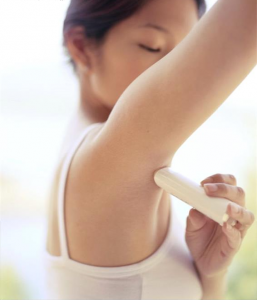The use of a daily hygiene product has shown to change the body’s bacterial community.
Antiperspirant –keeps you dry- studies shows it’s disrupting the bacterial community under your armpits. The study that was published in the journal Peer J, questions current lifestyle norms that might alter the human “microbiome.”
Microbiome refers to the trillions of bacteria and other microbes that live in and on the human body. The skin is covered in different microbes — majority of them are risk-free or help protect the skin and work with the immune system cells that dwell on the skin, according to the U.S. National Institutes of Health (NIH).
The study used 17 volunteers for an 8-day experiment. The first day the volunteers stuck to their daily hygiene product; 7 used antiperspirant, 5 used deodorant and 5 used no product. Day 2 through 6, volunteers refrained from all hygiene products. Day 7 through 8, volunteers all used antiperspirant.
The first day’s swab, researchers found antiperspirant users to have fewer bacteria than nonusers and deodorant users. Deodorant users had the most bacteria. Horvarth said those finding aren’t surprising. Deodorants use an antimicrobial ingredient to fight odor while deodorants prevent sweating –bacteria like to eat sweat. The study found that after the sixth day the group had similar amounts of underarm bacteria — but the type of bacteria differed. The no-product users had more corynebacteria – 62 percent – than staphylococcaceae bacteria –21 percent. Those who wore antiperspirant or deodorant had more staph bacteria.
“We know that these skin microbes interact with the immune system,” said Julie Horvath, lead researcher. “So it’s important to consider what our daily habits do to the skin’s microbiome.”
Anything put on the skin –lotion, makeup and even soap and water—may cause a change within the microbiome. But additional factors –age, gender and sun exposure- can also affect the microbiome, according to the NIH.
Hovarth initiate the antiperspirant study after her and a few colleagues tested their armpits to see what microbes were there. But Horvarth found her armpit swab contained no microscopic organisms.
“I thought, ‘Where are my microbes?’ And then I remembered the clinical-strength antiperspirant,” said Hovarth.
In a separate study, Pieter Dorrestein professor of Pharmacy and Pharmaceutical Sciences, found that “a lot of personal care products” — from deodorant to lotion to shampoo — remain on the skin, even after a few days’ break.
“The data also suggested that personal care and lifestyles may influence the microbes that reside on the skin surface,” said Dorrestein.
[aio_button align=”left” animation=”bounce” color=”blue” size=”small” icon=”none” text=”Learn More” relationship=”dofollow” url=”http://www.fenvir.com/”]
[aio_button align=”left” animation=”bounce” color=”red” size=”small” icon=”none” text=”Buy Now” relationship=”dofollow” url=”http://www.fenvir.com/order-now”]


